‘Rock Hudson’ explores life in two worlds
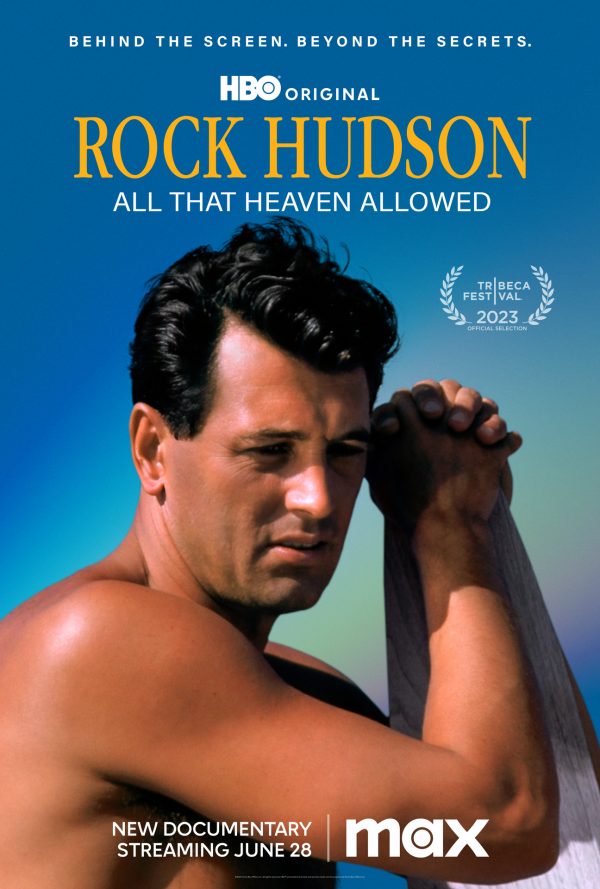
“Rock Hudson: All That Heaven Allowed” (2023). Cast: Current Interviews and Voiceover Observations: Armistead Maupin, Linda Evans, Mark Griffin, Piper Laurie, Peter Kevoian, Howard McGillan, Illeana Douglas, Allison Anders, Lee Garlington, Paul Garlington, Ken Jillson. Archive Interviews, Footage and Voiceover Observations: Rock Hudson, Elizabeth Taylor, James Dean, Doris Day, Tony Randall, Lauren Bacall, Lucille Ball, Jane Wyman, Tab Hunter, Robert Stack, Liberace, Truman Capote, Nancy Reagan, Ronald Reagan, Dean Rusk, Carole Cook, Kathleen Hughes, Joan Rivers, Rona Barrett, Joe Abrell, Ross Hunter, Douglas Sirk, Tom Santopietro, Beatrice Arthur, John Schuck, Claude Akins, Henry Willson, Phyllis Gates, , Jim Nabors, George Nader, Mark Miller, Tim Turner, Wes Wheadon, Ken Maley, Randy Shilts, Yanou Collart. Director: Stephen Kijak. Web site. Trailer.
To put it simply, Rock Hudson was gay, and, in those days, coming out about it publicly would have destroyed him professionally. For the sake of his career, Hudson had to keep his personal life a secret, and his handlers worked diligently to keep it under wraps. They carefully shielded his offscreen life from public scrutiny, advising him not to engage in activities that could expose him and even going so far as to discreetly arrange companionship for him. At the same time, his managers made a point of setting up public appearances with Hollywood starlets to reinforce the impression of his supposedly heterosexual orientation. This grew increasingly important as he approached 30 and was still single, prompting tabloids to speculate about the validity of his eligible bachelor image. It ultimately led to an alleged cover marriage with Phyllis Gates, the secretary of Hudson’s agent Henry Willson. And, as implausible as it might seem by today’s standards, Hudson’s cover story was never officially compromised, despite a number of whispers among skeptics and widespread knowledge about the truth of his lifestyle throughout much of the movie industry.
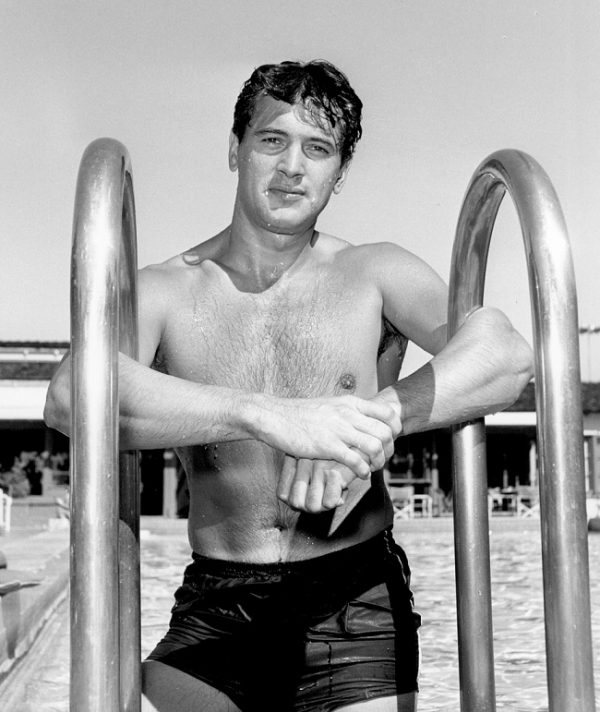
As a consequence of the foregoing, little was publicly known about the truth behind Hudson’s personal life. His handlers never hinted at what was going on, and a number of the actor’s co-stars, such as Elizabeth Taylor, Piper Laurie and Doris Day, never divulged a word about it, staunchly defending him and his privacy throughout his life. Yet, considering how much speculation swirled about Hudson’s private life (particularly after his marriage ended in divorce after less than three years), many have long wondered what his private life was really like.
That’s where this film comes in. It chronicles the two worlds in which Hudson lived – his carefully crafted public life and his intensely private personal life. Through interviews with friends like author Armistead Maupin and former partners, such as Lee Garlington, viewers learn about the “hidden” side of Hudson’s life and how well he was able to step back and forth between it and the public side of his existence. It’s the kind of life that, thanks to increasing tolerance of alternative lifestyles, has become less common (and less “necessary”) than it was in the past, especially for high-profile individuals like artists and entertainers.
While Hudson may not have been able to bring himself to enjoy the freedom of being “out,” he nevertheless appears to have enjoyed a fulfilling personal life, despite it being kept secret. He enjoyed the company of many good friends and companions, and he relished his sizable comfortable home, a hacienda-like residence commonly referred to as “the Castle.” And those who knew him often said that Hudson was one of the kindest, nicest, most loyal and most generous persons they had ever known.
However, meticulously managing the two sides of his life also had its drawbacks. In addition to his inability to open up about his personal life, Hudson’s professional image had become so ingrained in the public’s mind that fans often couldn’t bring themselves to envision him outside of the roles that had so solidly become associated with his persona. For example, when Hudson opted to star in director John Frankenheimer’s sci-fi thriller “Seconds” (1966), he delivered what many now regard as his best screen performance. But, given that this was a type of role that the actor was not accustomed to playing, fans and critics summarily rejected the picture and the portrayal, primarily because it didn’t come across as a typical Rock Hudson part. Because of that, he became principally relegated to roles more like those he had been playing throughout his career, both in movies and, increasingly in later years, on television.
As time passed, though, Hudson’s physical appearance slowly began to deteriorate. He lost weight and his signature good looks started to vanish, and, by the early 1980s, the public took note of the change. And then, in 1984, he was officially diagnosed with AIDS, again significantly fueling speculation about Hudson’s personal life. Despite the diagnosis, however, no official declaration about his sexuality was divulged. His illness raised considerable concern, though, when he appeared on the prime-time soap opera Dynasty, where he engaged in a kissing scene with co-star Linda Evans. Because so little was known about the transmission of this new illness at that time, there was much public furor over what was perceived as Hudson’s irresponsible behavior, given that he went ahead with the scene knowing that he already had the disease. (It should be noted, though, that Evans observes in the film that she knew Hudson was trying to keep her safe during the scene, considering that the kiss lacked passion, not the kind of embrace that would have been necessary to prompt transmission of the virus.)
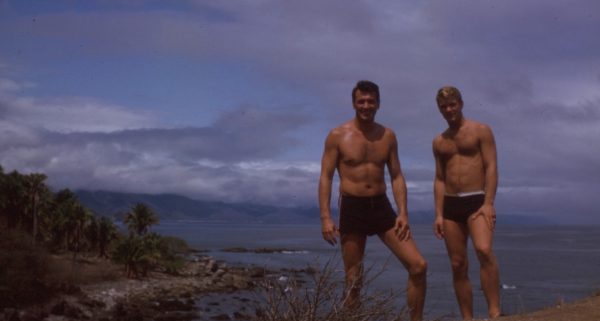
Hudson’s appearance in nine episodes of the TV series were to be his final ones as an actor. His health slid quickly thereafter, leading to his passing in October 1985. However, before his death, Hudson’s illness drew widespread attention to the disease, which had largely been ignored by the Reagan Administration at the time (an irony given that Hudson and Ronald Reagan were longtime friends). As one of the first high-profile individuals to contract AIDS, Hudson unwittingly became the face of the illness. When his diagnosis went public, research funding skyrocketed, in large part thanks to a sizable Congressional allocation and Hudson’s inaugural $250,000 donation to the nonprofit organization amfAR, The Foundation for AIDS Research.
Even though Hudson may have never openly stepped forward about his personal life, he nevertheless contributed significantly to the LGBTQ+ community, even if in an unintended way. The tragedy of his illness helped bring AIDS out of the closet and put it front and center on the stage of public dialogue. It’s unfortunate how that came about, but it made a mark, one whose contribution to the well-being of society is as noteworthy as any of those he made to the arts. This film pays homage to that contribution, showing us that Hudson was more than just a pretty face. In his own way, his efforts proved even more heroic than any of the characters he ever played.
Given how Hudson’s life played out, he followed a truly unconventional path. But it’s the one he needed to pursue to fulfill the objectives and experiences he felt he needed to get out of his existence, both professionally and personally, even if that meant making some difficult choices and compromises that many of the rest of us may have been unwilling or unable to make.
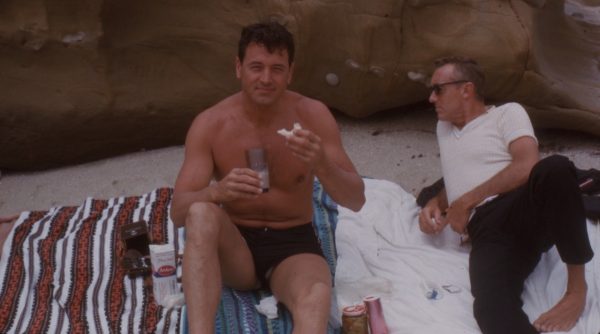
Consider the actor’s professional accomplishments. He created the conditions to make him one of Hollywood’s most sought-after celebrities for decades. Granted, he may have so expertly materialized an image that kept him from straying too far afield from the well-defined persona he manifested (an outcome reinforced by the beliefs of his handlers, fans and studio colleagues), but what he managed to create ended up bringing him fame and fortune, outstripping that of many of his peers. And, personally speaking, as this film reveals in depth for the first time, he apparently did the same in his offscreen life, amassing an array of friends, companions and experiences, even if he couldn’t be open about those relationships and pursuits. To be sure, the dichotomy that emerged from having to straddle those two separate worlds may have called for making some significant concessions and shuffling of priorities on his part, but, as this picture indicates, he appears to have adjusted to these conditions relatively successfully.
But, the foregoing successes aside, one can’t help but wonder how and why he drew AIDS into his life. As many conscious creation practitioners are well aware, illness can often be a profound, insightful teacher, despite its often-debilitating consequences. Also, it can frequently serve as a means of drawing attention to an issue in dire need of it. And, in its own way, those qualities were very much associated with AIDS at the time.
This naturally raises the question, “Were these reasons behind how Hudson became afflicted with the illness?” No one can really know for sure except the actor himself; whatever reasons were behind his experience with the illness were his own, and it’s not our place to question them. However, when we look at what came out of Hudson’s experience with AIDS, it’s easy to see how his diagnosis could conceivably be looked upon as a reflection of the notions raised above. The attention that his illness achieved in raising recognition about the condition was far greater than what virtually anyone else had attained prior to that time. The increase in research funding alone was truly significant. It’s indeed unfortunate that it took something like this to make that happen, but the importance of the silver lining to emerge from this cloud can’t be denied.
In this context, it’s also interesting to note the nature of AIDS as an illness – a condition affecting the immune system that leaves its victims powerless against a host of other diseases. And, when one considers the four target groups that were initially most readily affected by the illness – hemophiliacs, IV drug users, Haitian immigrants, and, most notably, male homosexuals – the one trait they all had in common was that they came from groups whose constituents often felt they had had their personal power taken away from them. What more drastic way is there to draw attention to their plight than to contract an illness that itself embodies the concept of powerlessness? It’s regrettable that it may have taken something so severe as this to make that point, but it’s not outside the realm of possibility, especially when one considers the beliefs that might readily underlie the emergence of a development such as this – and what its impact might ultimately yield.
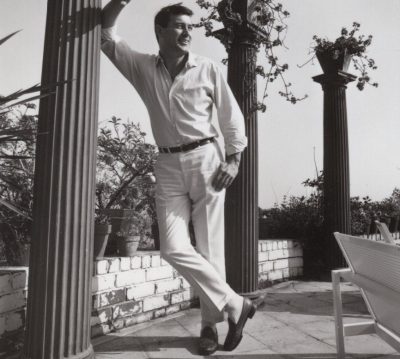
The existence of an illness like this could thus be seen as a form of social protest. The fact that the initial target groups were communities that were often ignored or looked upon with disdain by the rest of society illustrates how they may have had to resort to such drastic measures to get attention for their needs, such as funding for their care and recognition of their social and civil rights. In that vein, it’s curious how both of the foregoing concerns received far greater attention than they had previously. And, to a great degree, the appearance of high-profile victims like Hudson did much to help achieve that.
So was Hudson part of this protest? That’s hard to say, but, given the developments that emerged in the time after his diagnosis and death, it could be argued that he may have been an unwitting, unconscious participant in this initiative. He may not have been able to bring himself to come out during his lifetime, but that also doesn’t mean he didn’t have some degree of care, compassion and interest in veiled activism for his community. In his own way, he was thus able to give something back. It may not have been an open or overtly visible contribution, but it had impact nevertheless. In a sense, it could have been Hudson’s way of at last bridging those two separate worlds in which he dwelled, even if he hadn’t been consciously aware of it himself. And who says gay folks can’t be heroes?
Clean-cut All-American Boy Roy Scherer Jr. probably never envisioned the life he would eventually lead when he was growing up in Winnetka, IL. But, once he transformed into rugged, handsome matinee idol Rock Hudson, it all came together, even if it was not how and what he imagined. Director Stephen Kijak’s new HBO documentary presents a comprehensive look at Hudson’s professional and personal life, with ample film clips and interviews with those who worked with him and those who knew him privately. The film’s previously undisclosed insights about his personal life mark a significant change in how the actor is viewed. And, to bolster those impressions, the filmmaker has incorporated considerable irony in the choice of movie and TV clips included here, with many of them serving as quietly telling observations about the actor’s personal life. When viewed in this new light, these video segments represent muted but informative inside revelations about Hudson at the time these works were made. In fact, some of the content (particularly in the interviews about Hudson’s private life) could be seen as sexually explicit (though not gratuitous), but sensitive viewers should take heed nonetheless. In all, though, this insightful, respectful look at Hudson’s life as both a gifted entertainer and as an unlikely hero delivers a well-rounded biography of a man who toiled to strike a delicate balance in his two worlds, both for his fans and for those who shared his secret, an effort that ultimately yielded a lot of good in both areas.
Copyright © 2023, by Brent Marchant. All rights reserved.



